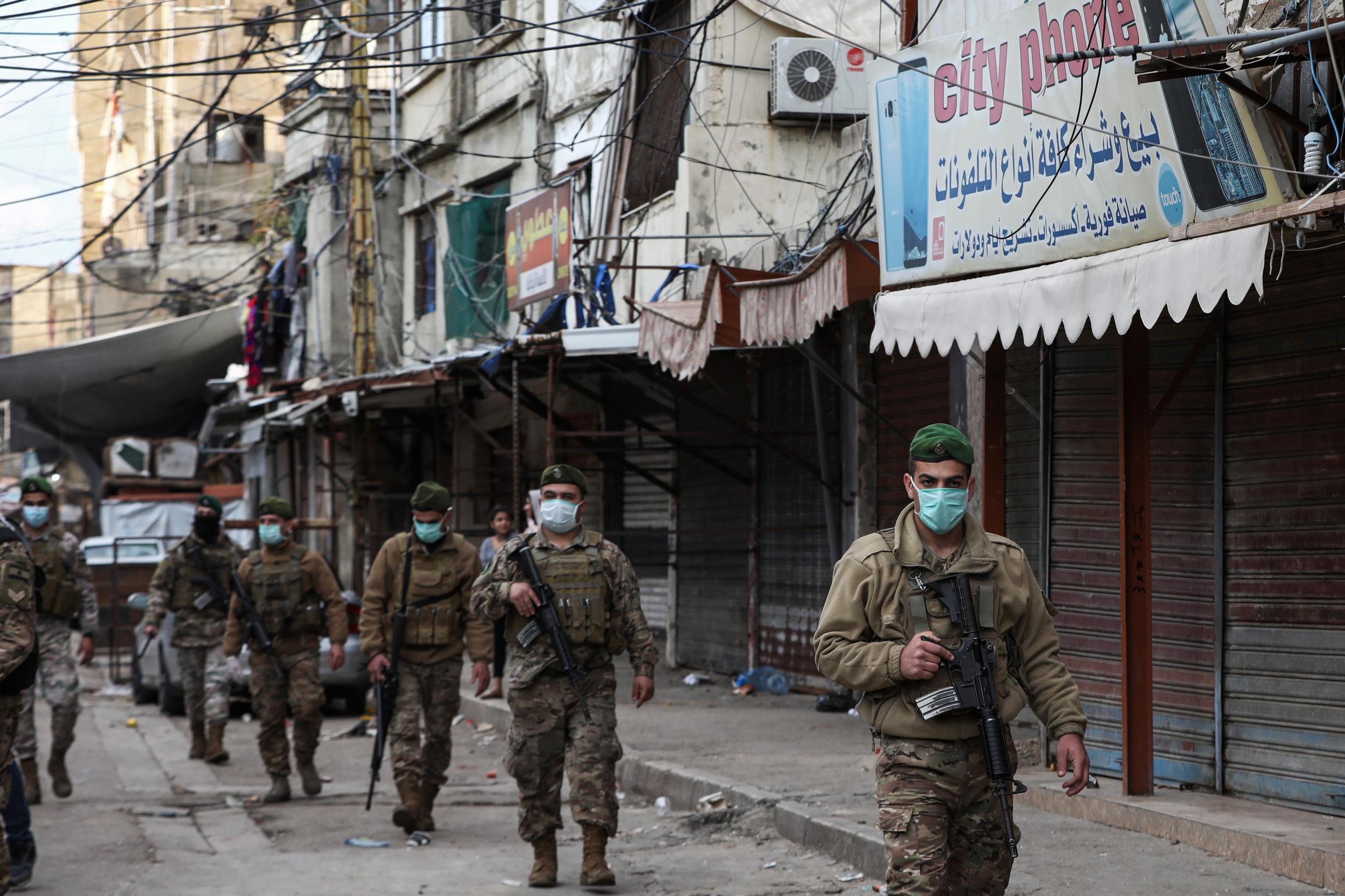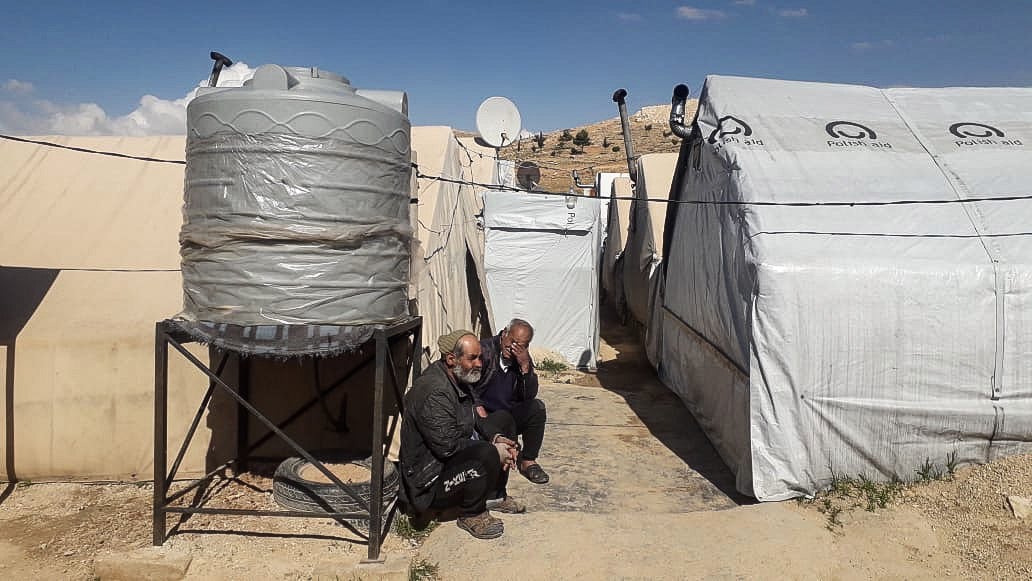‘We’ve survived wars but never faced this’: Inside the Lebanon refugee camps bracing for coronavirus
One in four people in Lebanon is a refugee, they are now among the most vulnerable to Covid-19
Your support helps us to tell the story
From reproductive rights to climate change to Big Tech, The Independent is on the ground when the story is developing. Whether it's investigating the financials of Elon Musk's pro-Trump PAC or producing our latest documentary, 'The A Word', which shines a light on the American women fighting for reproductive rights, we know how important it is to parse out the facts from the messaging.
At such a critical moment in US history, we need reporters on the ground. Your donation allows us to keep sending journalists to speak to both sides of the story.
The Independent is trusted by Americans across the entire political spectrum. And unlike many other quality news outlets, we choose not to lock Americans out of our reporting and analysis with paywalls. We believe quality journalism should be available to everyone, paid for by those who can afford it.
Your support makes all the difference.If Fairouz, 45, stretches out far enough she can touch the next tent belonging to her neighbour.
The distance between her battered shelter and the adjacent one is just 50cm.
That’s a quarter of the minimum distance they are supposed to be from one another, if people follow the coronavirus social distancing regulations.
Like most the 30 other families in this informal Syrian refugee camp in Arsal, northeastern Lebanon, Fairouz lives with four members of her family in one room.
The mother-of-three says they do not have enough water to wash their hands rudimentarily. They are already rationing food.
Fairouz fled her home in Qusayer, western Syria, under the snarl of artillery fire, thinking she would return in a few weeks when it had calmed down.
Four and half years later, she still lives in a tent in Arsal, just a few kilometres from the border.
“Every year has been progressively harder, but we never imagined we would face something like this,” she says, in a video call from her home.
“My biggest fear is one of my children getting the virus since we are not all registered refugees and do not have access to the healthcare or money to pay for treatment.”
She said that they are trying to disinfect everything but struggle to do so in the camp where access to water is limited.
“I just don’t think me and the children will be able to resist this.”
The Lebanese authorities have imposed a strict lockdown on refugee camps to try to halt the devastating spread of the disease.
In a different camp a few kilometres away, Khalid Malit, 41, who fled Syria eight years ago, uses his phone to take The Independent on a pixelated virtual tour.
“It is impossible to social distance, when every tent is less than a metre apart,” he says squeezing through the gaps between an alleyway of structures.
He points to a line of water tanks, saying the 40 litres per day they now get is still not enough to keep up with the hygiene requirements to fight the disease.
Khalid said while those registered with the United Nations receive some cash assistance and food parcels, it is not enough to survive now people cannot leave the camp to work.
Those who are not registered have no support at all and are desperate.
“People are already rationing their food, but I will not let anyone starve, we will find food for them,” he adds.
Refugees in Lebanon are among some of the most vulnerable people in the world to this deadly pandemic.
Many of them, like Fairuz and Khalid, live in rudimentary tents, or crammed neighbourhoods, scraping a daily living.
So far, the Lebanese health ministry has announced 500 cases of Covid-19 and 15 deaths across the country, although the actual toll may be much higher.
No cases have been registered among the refugee population.
The authorities have scrambled to try to stem the spread imposing some of the strictest measures in the region, including a full nationwide lockdown and night-time curfew. They have also shut the land and sea borders as well as the airports.

There is the potential for a disaster. Lebanon has the largest number of refugees per capita in the world: according to the UN, one in four people in Lebanon is a refugee.
Among those are an estimated 1.5 million Syrians, 40 per cent of whom are not registered with the UN and so are not eligible for cash assistance, food parcels or, until recently, help with medical care.
There are an additional UN-registered 470,000 Palestinian refugees in Lebanon, including 30,000 who have fled from Syria since the start of the civil war. They also face work permit and healthcare restrictions making them vulnerable too.
Before a global pandemic reached Lebanon’s shores, the country was already reeling from an unprecedented financial crisis and revolution.
Pre-coronavirus the World Bank estimated that by the end of 2020 a staggering 40 per cent of the country will be under the poverty line.
Lebanese economists now think that is optimistic. With the lockdown shutting down businesses and jobs, the actual poverty rate will be far higher.
That per cent is already higher among the refugee population. The UN refugee agency UNHCR said at least three-quarters of the Syrian community in Lebanon live under the poverty line.
For the first time the entire world is in crisis, there are few that can help us
In Shatila camp in southern Beirut, Palestinian refugee Eman Hussein, 29, who fled Yarmouk refugee camp in Syria, said she is scared the new coronavirus lockdowns will mean she is unable to feed her new baby.
“Neither me nor my husband have the paperwork from the UN to allow us to work or move around the country, neither can we get food aid,” she says.
“We struggled before this all happened, but now we are really scared. My baby is just 7 months old, we don’t know how we will survive this period.”
Abdel-Majid Ayyoub, from Syria, who helps manage two informal camps in the northern area of Akkar, said those who had savings were now feeding those who do not.
“At least 80 per cent of the people here were unemployed even before the pandemic,” he says by phone.
“We have created a group of five people who go outside to get supplies. People are using all their savings to support each other.”
Work has long been a problem for refugees in Lebanon.
Last year Palestinian refugees, who by law cannot seek employment across 39 professions in Lebanon, protested against new Lebanese labour ministry legislation requiring them to have special work permits.

Lebanon’s Higher Defence Council that same year cracked down on Syrians working without authorisation, according to Human Rights Watch.
Now Abdel-Majid said one of the main concerns was the cost of treatment if people catch the Coronavirus. Three years ago, his own brother-in-law died of cancer because the family could not pay the medical bills.
“We are concerned people will not declare their illness for fear of the fees,” he says.
Representatives from UNHCR and the United Nations Relief and Works Agency for Palestine Refugees in the Near East (UNRWA) say that they will cover most – if not all – the medical costs for refugees with Covid-19 and have started an awareness campaign across the different camps and informal settlement areas explaining this.
There is a hotline refugees can call if they experience symptoms.
But there is a question mark for the tens of thousands who are not registered refugees.
“We are working on building self-isolation units in the camps or informal settlements for refugees,” said Lisa Abou Khaled from UNHCR.
She added they were seeking funding to be able to provide more cash assistance.
UNRWA, which is in the grips of its worst-ever funding crisis, is also seeking additional donations to increase cash and food assistance to Palestinians in Lebanon.
But it is under extreme pressure: UNRWA is due to run out of money next month.
Claudio Cordone, UNRWA’s Lebanon director, said they were working with medical charity Medecins Sans Frontieres to turn one of UNRWA’s centres into a dedicated refugee isolation centre to treat mild cases and take the load off Lebanon’s ailing health system.
“We have been given assurances from the Lebanese authorities that all residents of Lebanon would be treated in the hospitals,” Mr Cordone said.
“The test will be when the healthcare system is overwhelmed and there is a choice between a Palestinian and Lebanese patient,” he added.
There are also worries about other discriminatory practices against refugees.
Human Rights Watch said on Thursday, 21 Lebanese municipalities have introduced tougher measures for the refugee population than Lebanese citizens including more stringent curfews.
In other parts of the country like northern municipality Darbaashtar, Syrians were briefly prohibited from leaving their homes completely – prompting concerns they would be unable to access medical help.
“The coronavirus does not discriminate and limiting the spread and impact of Covid-19 in Lebanon requires ensuring that everyone is able to access testing and treatment centres,” Nadia Hardman, an HRW refugee rights researcher and advocate said.
Lebanese municipality workers in charge of maintaining the camps say they are working around the clock with minimum staff to try to help.
The problem the Lebanese are already facing massive problems, we are finding it hard to help refugees.”
“The reality is depressing, the refugees will face huge problems this year,” said Khaled Essultan, in charge of the Arsal area. He said due to the coronavirus restrictions, his employees and volunteers cannot work in the camp.
“The problem is we are struggling. The Lebanese are already facing massive problems, we are finding it hard to help refugees.”
Disinfection campaigns are underway to try to keep people safe, but many refugees fear they cannot follow World Health Organisation guidelines amid clean water shortages.
“I have survived three wars, but even in 2006 we could always go out and find food, get support,” says Mohamed Kasem, 40, from Nahr al-Bared Palestinian camp, in southern Lebanon, which was under siege and partially destroyed in 2007.
“We look with horror at what Italy, France, Spain are going through. For the first time, the entire world is in crisis. And so we know there are few that can help us. And this makes it the hardest.”
*The names of some of the refugees have been changed to protect their identity

Join our commenting forum
Join thought-provoking conversations, follow other Independent readers and see their replies
Comments